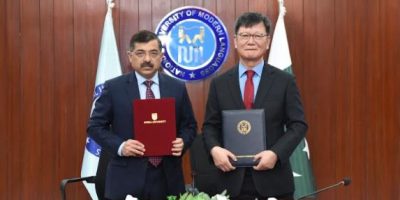Education 4.0 in Pakistan: A precautionary call before disaster

We need a leader with telescopic visions and navigational capabilities.
Education is very vital for the development, prosperity and sovereignty of a country. It is important not only for individual development, earnings and employment but also for the country’s prosperity, economic stability, creativity & innovation, harmony & peace and for social stability. Educational system in Pakistan is not only out dated but also we are far behind from the rest of the surrounding world. Economically, Pakistan is at the 153rd position out of 174 countries and is included in ten countries with worst educational system. Many poorer countries have better literacy rate as compared to Pakistan. Low literacy rate not only decelerates economy growth but also impedes human development, skills, creativity and self-efficacy. We are witnessing technological revolutions, drastic and swift changes all around us and receiving revolutions to impact lives, societies and global human interactions. Due to digital advancement, the world is changing at a very high pace. So, it is the time to make ourselves compatible with the pace. Pakistan is already facing many crises, economically, politically, nationally and internationally. The only solution to all these is quality education. We cannot predict future but if we couldn’t pace our quality education, we will face digital divide and gap nationally and internationally with a catastrophic end. Are we ready for these emerging challenges in education and society along with existing issues?. For this, we need a leader with telescopic visions and navigational capabilities. To meet the new demands of tech world and to take countermeasures for technological challenges, Education 4.0 is a contemporary slogan among the educational reformers. The role of education is becoming more vivacious to address disruption, divide and to meet skills requirement with the rapid technological advancement. So, we have to understand Education 4.0 with the context of Industrial Revolution (IR) 4.0 and we have to be vigilant about future challenges.
Late in the 18th century, the first Industrial Revolution 1.0 occurred with generation of water and steam engines for mass and quality production in industry. Its impact appeared in the form of urbanization, boosted economy, massive transportation and industrialization. The introduction of paper-making machine, mechanical printing and type-writers unwrapped new integrations in Education 1.0 for limited fortunate societies only. However, the teacher remained the center of education in this era. The 20th century emerged on the calendar with Industrial Revolution 2.0. Water and steam engine were replaced by oil and electrical energy, mass production and industrialization emerged with low cost. Fertilizers, engines and aerodynamic industries are the product of IR2.0. However, Education 2.0 corresponded itself with IR 2.0 by introducing electronic devices such as computer, multimedia and printers etc. Mass education, standardization, large classes and open & new universities were constructed during this era. The role of teacher shifted from transmitter to facilitator. Computers, transistors and automation has reduced the efforts, costs & work-load and has introduced swiftness & global supply chain in industry by the end of the 20th century, with the immergence of Industrial Revolution 3.0. In Education 3.0, Semantic web, smart mobile devices and internet services were introduced. Students became more conscious about learning styles. Now their role shifted from passive listener to active and participative learner in the classroom. Teacher’s role shifted as collaborator and facilitator. Online and mobile learning became the area of interest for researcher, educator and students as well. However, personalized learning remained wrapped. The concepts of digitization, globalization and mass production were coined during the Industrial Revolutions 1.0 to 3.0. However, IR 4.0 is diversified from all previous revolutions. The notion of Industrial Revolution 4.0 was propelled by Germany in 2011. It is a blend of Virtual/Augmented reality, Artificial Intelligence, robots, 3D printing, Internet of things, Simulation, Cyber security, material science, System integration, bio and nanotechnology, quantum computing, big data and cloud computing. Humans are being replaced by machines and distorted lines have been drawn between digital, biological and physical worlds. Societies, cultures, industries and economies are being intermingled with each other. So in response to IR 4.0, the term Education 4.0 emerged to align dents of disruption and to fill digital gaps among and within the societies. Societies, economies cultures, living and working standards are being transformed by the Industrial Revolution 4.0. So, it is vital to acclimate the educational system with the emerging issues and requirements of the new societies. Education 4.0 is interlinked with IR 4.0, focusing on the future education of technology and automation. Education 4.0 is addressing all the requirements of IR 4.0 by using technologies. Learning and teaching styles have been changed to ensure the future needs of the workforce and skills. It is a system that transmits quality education along with skills in a self-paced modus as per learner’s needs and capabilities. It is providing quality of information from the globe to teachers and students in a non-traditional way. The concept of Massive Open online Course (MOOCs), Flipped Classroom, smart learning, Open & online learning, self-paced & skill based learning, personalized learning and integration of modern technologies are embraced by Education 4.0. Creativity, Critical thinking and problem solving skills are fundamentals of Education 4.0. The globe is being changed in all aspects: economically, socially and emotionally with the rapid advancement of technology. Systems are being revolutionized, multi-disciplinary approaches are being adopted. New earnings opportunities are emerging in developed and educated world. Nonetheless, digital divide, disruption, social inequality, cyber security, industrial destruction and ethical issues will become fortune for developing and under developing economies like Pakistan along with existing issues. Nations with strong economy and high literacy rate have potentials to acclimatize with advancements linked Industrial Revolution 4.0. They have capabilities to take counter measures against emerging issues as digital divide, disruption, unemployment, cyber security industrial destruction and skills gap. Pakistan’s education system is not only out dated but also has many flaws to meet emerging demands. Our educational system is still focusing on outdated instructional techniques and learning styles. Learning is still confined to physical building school and decelerating the literacy. Examination system is still a measuring inventory of memorization. It is the time to announce education emergency as emergencies have been implemented for natural disasters in 2005 and now 2022. It is the time to revive the whole educational system. Education is the only tool to accelerate economic development and social stability. This can be achieved by making education a priority and budgeting wisely for education. Although budgeting is a foremost impedance for adaption of Education 4.0. However, to embrace minimal features of Education 4.0, at initial stage with available resources, we have to invest in three areas: teacher training, curriculum and pace of learning. Teachers and educators can play a pivotal role for prompt and optimistic revolution in education. So, we have to invest in perpetuation of teacher’s dignity first and then in pre-service and in-service teachers training. Our curriculum is antediluvian and we have to revise our curriculum on futuristic approach as far as we can, to prepare our future generation for IR 4.0 skills and to enable them for contribution in global citizenship. To pace up learning efficiency and effectiveness, we have to augment the use of digital technology in education. It is a soft precautionary call before disaster. We have to invest in transformation of Education 4.0. We have to rethink, reimagine, revalue and revive the education. Otherwise, we have to keep in mind “Are our all stakeholders (Leaders, Teachers and parents etc) ready for accumulation of forthcoming challenges of IR 4.0 into prevailing ones or we can say for catastrophic end?” “We do not yet know just how it will unfold, but one thing is clear: the response to it must be integrated and comprehensive, involving all stakeholders of the global polity, from the public and private sectors to academia and civil society (Schwab, 2016, p. 1).” For feedback to author: Muhammad Waseem [email protected] Contact at: 0323-5172174Related News

45 Bangladeshi students arrive in Pakistan to pursue higher studies
ISLAMABAD, FEB 16 /DNA/ – The first batch of 45 students from Bangladesh, selected forRead More

NUML, Korea University ink academic pact
ISLAMABAD, FEB 13 /DNA/ – A Letter of Interest (LoI) was signed between the NationalRead More


Comments are Closed